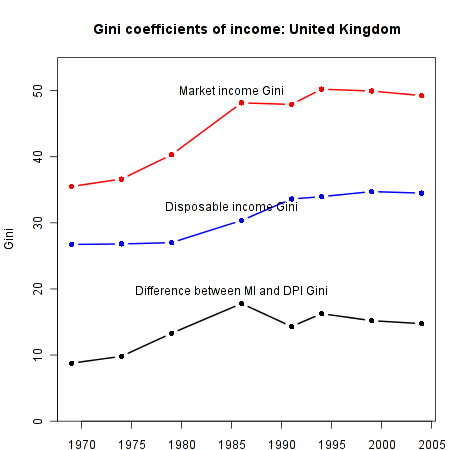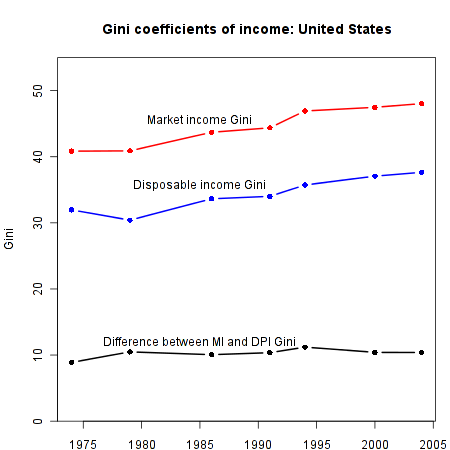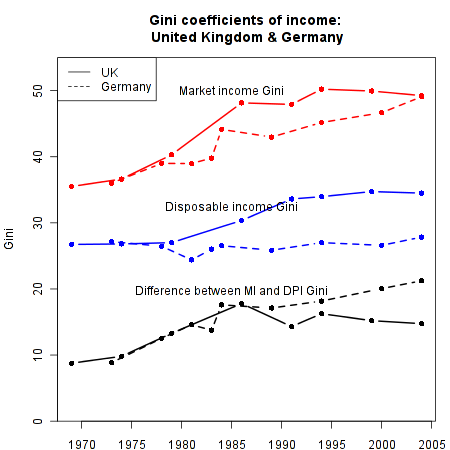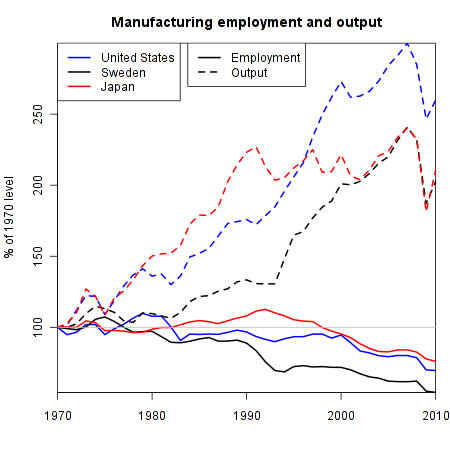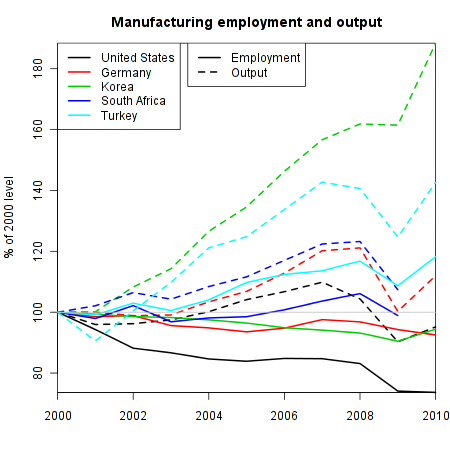In the new *Jacobin*, Mike Beggs has a [great article about Marxism]( http://jacobinmag.com/summer-2011/zombie-marx/) in which he lays out an approach to Marx's thought that very much resonates with my own conception of Marxism:
> If we are to engage in these ways with modern economics, what, if anything, makes our analysis distinctively Marxist? It is the two-fold project behind Capital as a critique of political economy: first to demonstrate the social preconditions that lie beneath the concepts of political economy, and especially their dependence on class relationships; and second, to demonstrate these social relations as historical, not eternal.
> These two strands of Marx’s thought are as valid as ever. The way to apply them today is not to maintain the form and content of Capital as a complete, separate way to approach economics, as if we are superior because we begin from superior principles. Instead, I think it is to approach modern economics as we find it and ask the same kinds of critical questions: what are the social conditions that make economic phenomena appear the way they do? It is to deal not only, not even mainly, with economic high theory, but also with the applied economics produced every day in the reports and statements of central banks, Treasuries, the IMF, etc., and ask, what are the implicit class relations here? Why are these the driving issues at this point in history? What are the deeper social contradictions lying behind them? The pursuit of a separate system of economics as something wholly other from mainstream economics isolates us from the political and ideological space where these things take place: better, instead, to fight from the inside, to make clear the social and political content of the categories.
Beggs also posted a fascinating [letter from Joan Robinson](http://jacobinmag.com/blog/?p=632) on the topic of non-orthodox Marxism, prompting a post from [Kieran Healy](http://crookedtimber.org/2011/07/17/what-i-mean-is-that-i-have-marx-in-my-bones-and-you-have-him-in-your-mouth/).
Contrast this with the recent series of posts at Crooked Timber, where John Quiggin wrote on "Marxism Without Revolution". There he poses the question: "what becomes of Marxism if you abandon belief in the likelihood or desirability of revolution?" Quiggin's own politics are a form of Keynesian Social Democracy, which he sets in contrast with what he sees as the inadequacy or obsolescence of the revolutionary Marxist tradition.
But Marxism is only obsolete if you approach it in the spirit of what Beggs calls the "zombie Marxists". Like Quiggin, my day-to-day politics are in many ways social democratic--I am concerned with elections, welfare state policy, and the like. Unlike Quiggin, I consider myself a Marxist, primarily because I do still believe in "revolution" in the sense of a transition to a post-capitalist society, though not necessarily in the sense of an insurrectionary seizure of state power by a revolutionary movement.
However, Quiggin raises a number of important points about what is or isn't still relevant in Marxism, so I found it useful to work out in some detail where I do and don't agree with his takes on three major aspects of Marxism: class, crisis, and capital.
### Class
In the [first post](http://crookedtimber.org/2011/06/19/marxism-without-revolution-class/), Quiggin says that:
> The analysis of economics and history in terms of class struggle is the central distinguishing feature of Marxism, and remains essential to any proper understanding. That said, the specifically Marxist class analysis in which the industrial working class, brought together in large factories, and increasingly homogenized and immiserised, serves as the inevitable agent of revolution, clearly hasn't worked and isn't going to.
I don't quite agree with the first sentence: class struggle was obviously a preoccupation of Marx, but I don't think that the explanation of history as the product of class struggles is necessarily the most important part of the theory, or the one most relevant to the present day. I will return to that point below.
I do, however, agree with the second point. In Marxist thought, two meanings of "the working class" are often conflated. At a high level of abstraction, the working class is all those who make their living by working for others rather than by owning the means of production and hiring employees to operate them. In this sense almost all of us are working class; yet as Quiggin observes, the working class in this sense is too heterogeneous and diffuse to form a self-aware "class for itself". Thus Marxists have also long spoken of a working class defined in more narrow sociological terms as given here by Quiggin.
And I agree with Quiggin that the industrial, factory-based working class is unlikely to serve as the collective agent of revolution due to its declining centrality in capitalist economies. Indeed, this very problem is at the heart of my new essay in *Jacobin* (not currently online), in which I reach back to a theory of non-class based collective identity (Benedict Anderson's theory of nationalism) in order to extract some ideas about where the collective revolutionary agent may come from in 21st Century America.
So what use is Marxism, without its central collective actor? We can extract the aspect of Marxist class analysis that is still useful, if we think more carefully about the paradoxical position that the working class occupies in Marx's thought. On the one hand, the working class in the narrow factory-industrial sense was supposed to be the group that led and carried out the revolution against capitalism. But on the other hand, the working class in the most general sense--as wage labor--is also the thing that is supposed to be *abolished* by the revolution. The notion of a class that simultaneously realizes and abolishes itself is a clever historical irony, but it is perhaps easier to imagine that the task of abolishing wage labor would be carried out by people who, while they are wage laborers, do not *identify* themselves or their movement as "working class" first and foremost. Certainly it's tempting to think so today, when identification with the idea of being someone who "works" is so often bound up with [a reactionary politics](http://jacobinmag.com/winter-2011/hipsters-food-stamps-and-the-politics-of-resentment/) of producerist *ressentiment*.
The above, then, is my response to the way Quiggin ends his post. He notes that while the traditional working class may be disappearing, it is still quite coherent to speak of a "ruling class", the top 1 percent of society. But if there is a coherent ruling class and only an inchoate exploited class, then Marxism risks ending up in a defeatist dead end. What I am trying to suggest, however, is that such defeatism is not inevitable. What is necessary instead is a recognition that while the oppressiveness of wage labor as a system of domination has not disappeared, we no longer know what the political vehicle for overturning that domination will be. The answer is not to give up, but to think harder about different models of collective identity and movement formation.
### Crisis
Quiggin [breaks Marx's theory of crisis into two parts](http://crookedtimber.org/2011/06/25/marxism-without-revolution-crisis/) . The first is "the idea that crisis is a normal part of capitalism rather than an aberration resulting from exogenous shocks." The second is "crises would grow steadily more intense, driven by the declining rate of profit, until they brought about the revolutionary overthrow of the system."
The first component is, I agree, a major intellectual contribution of Marx's, but I interpret its importance somewhat differently than Quiggin, as explained below. As to the second component, it seems to me that Quiggin is making the same error here that he does in the discussion of class: he insists that Marxism must be closely tied to a doctrine of historical inevitability. Now, there is no doubt that Marx did at times speak in these terms, sometimes for rhetorical effect. And some of the Marxists who followed him (like Kautsky) went much farther in this direction than the founder himself did. But this is not all Marxism is. It is much more helpful to think of it as a systemic, structural account of capitalism, and a way of thinking of the various *possibilities* for moving beyond capitalism. Speaking of crises "bringing about the revolutionary overthrow of the system", as Quiggin does, is at best vacuous and at worst counter-productive. At one level, clearly capitalism cannot last forever, and so sooner or later a crisis will end it. But there is always the choice between "socialism or barbarism", as Rosa Luxemburg put it. And if Marxist-influenced political movements just wait around for the crisis rather than thinking about ways to *take advantage* of the crises that inevitably arise, then they will fall into just the kind of passivity and defeatism that Quiggin warns against in his post on class.
This last idea, that anti-capitalist movements must take advantage of capitalist crisis, is in my view the most productive use to which Marxist crisis theory can be put. In a way, this makes my critique of Quiggin's crisis post the inverse of my critique of the class post. Above, I argued that what was especially important in a specifically Marxist class theory was the more "apolitical" structural element, which identifies wage labor as both a defining category of capitalist society and the source of a morally odious form of domination. What has been rendered superfluous is the political argument about the importance of the fraction of the working class working as a factory proletariat. With regard to crisis, my intuition is rather the opposite: I place less emphasis on the structural place of crisis within capitalist development, and instead I emphasize the *political* meaning of crisis and its importance in thinking about the transition *out* of capitalism.
The way to think about crises in capitalism is not in terms of historical inevitability. On the contrary, crises are the moments when the system is at its least deterministic and most full of alternative possibilities. The last major crises prior to the present one, in the great Depression and the 1970's, were also the last times when the continued survival of capitalism really appeared in question. Of course, capitalism prevailed and instituted a new regime of accumulation, but this does not mean this was the only possible outcome; history is in some measure stochastic, and there is no reason to be certain who would prevail if we could "run the tape again". Rather than thinking of post-capitalism as a single *telos* that we will arrive at when the conditions within capitalism are "ripe", we should think of the repeated crises of capitalism as producing "branching-off points" in historical time: each crisis *could* have been the jumping-off point for a successor to capitalism (and those hypothetical successors would each have been different and historically specific), or for a new and revivified capitalism. As things actually turned out, of course, capitalism won out each time. But that's all the more reason to think about how things might go differently next time.
Today, of course, there is precious little evidence of anyone using the global crisis to challenge the capitalist system; on the contrary, the elite has further entrenched its rule. This has lead some on the Left, like Doug Henwood and Duncan Foley, to forcefully argue against the idea that crisis is ever "good" for the Left. I agree with them in the narrow sense that it is counter-productive to just sit around and passively wait for a crisis to come along and abolish capitalism, and yet I also think their line of critique misses a larger point about the dialectic of reformist struggles and crisis in capitalism. It's true, as they argue, that incremental victories for the working class--higher wages, an expanded welfare state, and so on--are more likely to be won in stable, healthy economic times rather than in a crisis. But these very reforms tend to reduce the profit rate, erode labor discipline, and generally tip the balance of power away from capital and toward labor. For the ruling class, this is [intolerable on both a political and an economic level](http://mrzine.monthlyreview.org/2010/kalecki220510.html), and hence the progress of reform itself tends toward crisis--a crisis which must either discipline labor or replace capitalism. The crisis of the 1970's was a crisis not just of capital, but of the whole Keynesian-New Deal-Fordist class compromise of the postwar years.
If achieving pro-worker reforms tends to produce capitalist crisis, then clearly the left--even, or especially, the reformist Left--needs to have a strategy for directly addressing the crisis, one that goes beyond just preserving an untenable status quo. This, I believe, was one of the fundamental shortcomings of the late 20th century socialist movement. On the reformist, social democratic side, you had parties that understood how to make incremental, day-to-day progress, but were flabbergasted in the face of a crisis, though there were a few intriguing stabs at a transformative strategy such as the [Meidner plan]( http://www.counterpunch.org/blackburn12222005.html). On the revolutionary Communist side, you had parties that ignored such incremental work entirely in order to wait around for the big crisis. Neither perspective is adequate, and what is needed instead is a dialectical synthesis of reform and revolution.
### Capital
Quiggin's [final post](http://crookedtimber.org/2011/07/01/marxism-without-revolution-capital/) is about capital, which I view as really the central category of Marx's mature thought. (The long version of why I think this is more or less Moishe Postone's *Time, Labor and Social Domination*.) Quiggin begins with some stuff about the labor theory of value, but debates about that tend to devolve quickly into uninteresting scholastic disputes about "transforming" values into prices, which is neither very interesting nor very central to what Marx was trying to do. He quickly moves on, however, to something much more important:
> Most importantly, capital is not just an aggregate of machines, buildings, trading stock and so on. It is a social relation, and gives rise to a kind of society quite different from previous societies where power over land was the core relation.
This notion of capital as a social relation structuring society is absolutely central to my definition of Marxism, and it relates back to my earlier critique of Quiggin's post on class. What defines capitalism is not a relationship between people, such as capitalists and workers. Political struggles may manifest themselves as contests between groups of people, but the identity of the specific people is not what is fundamentally at stake. This is unlike a pre-capitalist society defined by relations between lords and peasants, say.
Capitalism is constituted by a relation between two *categories*, capital and wage labor. Each of these categories refers to a particular pattern of actions that is detached from the needs or desires of individual people. The imperative of capital is to turn money into an ever-greater quantity of money irrespective of the particular economic activity by which this is accomplished. The imperative of wage labor is to perform work that one has no inherent interest in so as to acquire the money needed for survival. These categories can overlap and interpenetrate even within the same individual (I am a worker, and I also invest in the stock market). Indeed, as I argued in an [earlier post](www.peterfrase.com/2011/03/capitalism-without-capitalists/) on "capitalism without capitalists", it is possible to conceive of a society that is structured by the opposition between labor and capital, but in which no human beings occupy the role of "capitalist".
At the end of the last post, Quiggin describes the politics of his own non-Marxist social democracy:
> Capitalism is more dynamic than any previous society, but also, in its pure form at least, more unstable, and at least as unequal. These features have been amplified, in ways we have yet to fully comprehend, by the explosive financialisation of the last three decades or so. . . . The problem for social democrats is to keep the dynamism and innovation while delivering more stable and sustainable, and less unjust outcomes.
I agree with the diagnosis of capitalism, but I define the political problem differently. It may be possible to deliver "stable and sustainable" capitalism for a while, but ultimately such a project is both self-contradictory and morally inadequate. Moreover, I suspect that maintaining "dynamism and innovation" in the present era of immaterial production depends on getting *beyond* capitalism rather than depending on it; the alternative is the stagnant artificial scarcity of [anti-Star Trek](http://www.peterfrase.com/2010/12/anti-star-trek-a-theory-of-posterity/). I would say that the problem for Marxist social democrats is to figure out how to build political movements that can win concrete material rewards for people through piecemeal reform, while also creating the conditions for moving society away from the dependence on wage labor and towards other kinds of voluntary forms of productive activity. But I will wait for another post to say more about what I mean by that.
